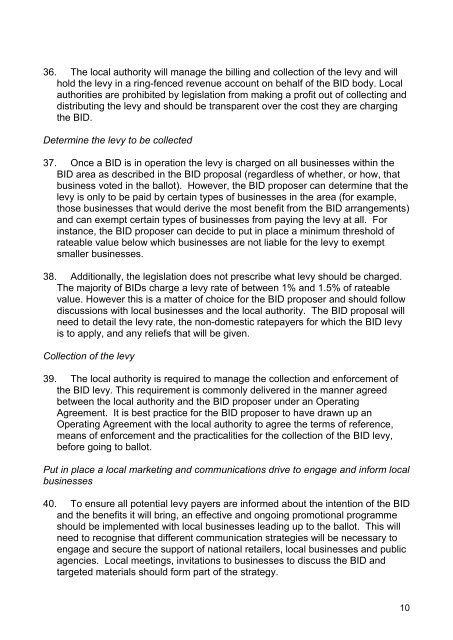BIDs_Guidance_and_Best_Practice-1
You also want an ePaper? Increase the reach of your titles
YUMPU automatically turns print PDFs into web optimized ePapers that Google loves.
36. The local authority will manage the billing <strong>and</strong> collection of the levy <strong>and</strong> will<br />
hold the levy in a ring-fenced revenue account on behalf of the BID body. Local<br />
authorities are prohibited by legislation from making a profit out of collecting <strong>and</strong><br />
distributing the levy <strong>and</strong> should be transparent over the cost they are charging<br />
the BID.<br />
Determine the levy to be collected<br />
37. Once a BID is in operation the levy is charged on all businesses within the<br />
BID area as described in the BID proposal (regardless of whether, or how, that<br />
business voted in the ballot). However, the BID proposer can determine that the<br />
levy is only to be paid by certain types of businesses in the area (for example,<br />
those businesses that would derive the most benefit from the BID arrangements)<br />
<strong>and</strong> can exempt certain types of businesses from paying the levy at all. For<br />
instance, the BID proposer can decide to put in place a minimum threshold of<br />
rateable value below which businesses are not liable for the levy to exempt<br />
smaller businesses.<br />
38. Additionally, the legislation does not prescribe what levy should be charged.<br />
The majority of <strong>BIDs</strong> charge a levy rate of between 1% <strong>and</strong> 1.5% of rateable<br />
value. However this is a matter of choice for the BID proposer <strong>and</strong> should follow<br />
discussions with local businesses <strong>and</strong> the local authority. The BID proposal will<br />
need to detail the levy rate, the non-domestic ratepayers for which the BID levy<br />
is to apply, <strong>and</strong> any reliefs that will be given.<br />
Collection of the levy<br />
39. The local authority is required to manage the collection <strong>and</strong> enforcement of<br />
the BID levy. This requirement is commonly delivered in the manner agreed<br />
between the local authority <strong>and</strong> the BID proposer under an Operating<br />
Agreement. It is best practice for the BID proposer to have drawn up an<br />
Operating Agreement with the local authority to agree the terms of reference,<br />
means of enforcement <strong>and</strong> the practicalities for the collection of the BID levy,<br />
before going to ballot.<br />
Put in place a local marketing <strong>and</strong> communications drive to engage <strong>and</strong> inform local<br />
businesses<br />
40. To ensure all potential levy payers are informed about the intention of the BID<br />
<strong>and</strong> the benefits it will bring, an effective <strong>and</strong> ongoing promotional programme<br />
should be implemented with local businesses leading up to the ballot. This will<br />
need to recognise that different communication strategies will be necessary to<br />
engage <strong>and</strong> secure the support of national retailers, local businesses <strong>and</strong> public<br />
agencies. Local meetings, invitations to businesses to discuss the BID <strong>and</strong><br />
targeted materials should form part of the strategy.<br />
10


